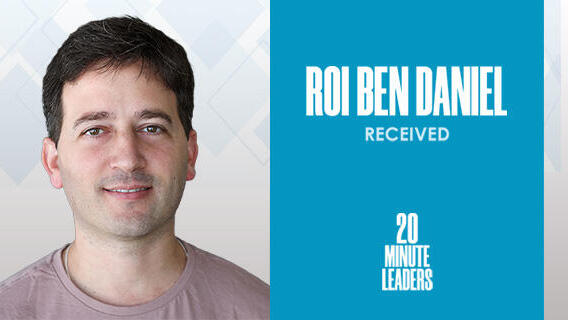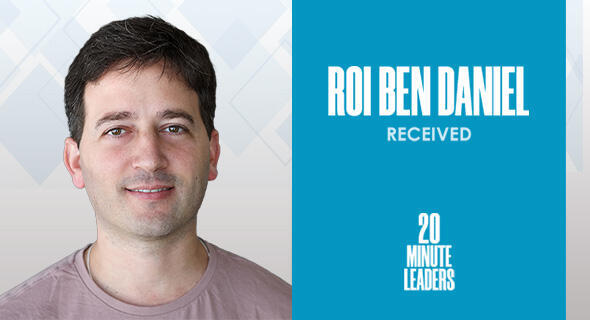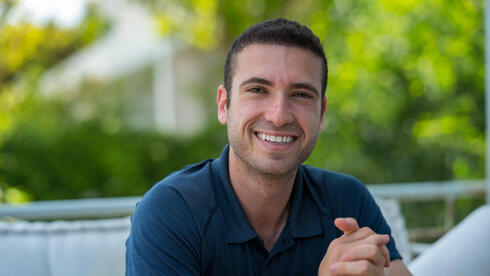
20-Minute Leaders
“I want to be a CEO that drives people by conviction and by action.”
Using your own example and convictions rather than relying on your spot on the org chart results in better leadership, says Roi Ben Daniel, co-founder and CEO of Received.
Using your own example and convictions rather than relying on your spot on the org chart results in better leadership, says Roi Ben Daniel, co-founder and CEO of Received. He explains that he wants to drive others by his actions as a leader, not his position. He honed his leadership skills in the military and while working for Visa, which brought him into the finance world. Daniel says FinTech is in its second phase and will soon look completely different. He is part of that change with Received, which aims to improve B2B payments. He explains this will aid companies’ revenues and cash flows while also helping finance professionals. He says they need a tool to automate tedious tasks so they can use their talent on more important things. Daniel shares that entrepreneurship is a risky journey, but he loves the creative freedom and problem solving that come with it.
Click Here For More 20MinuteLeaders
You’ve had a really interesting journey, from a platoon commander to the legal sector, an MBA in Chicago Booth, to Digital Partnerships and Visa Ventures, and, for the last year, founder and CEO of Received. Who are you, Roi?
I grew up in Jerusalem to a religious family. I'm nonreligious today, but actually many of my values in my daily life are based on the values I was educated in. My mother was a teacher; my father, he was a hard working entrepreneur. When I grew up, I saw him doing very hard labor setting up the businesses and providing for us. A lot of who I am today is thanks to them.
I served for four years in the military where I was a tank platoon commander. I learned the meaning of camaraderie, teamwork, and leadership. When you are an officer or a commander in reserve, no one cares about your rank. It's just how you are able to drive people just based on what you do and what you say.
How did that come about in your personal experience?
I would say there's two parts to that. One is me being a CEO. It's really easy to get confused between the person and the position that we fill. I want to be a type of CEO that talks on eye level and drives people by conviction, by data, by action, by setting an example. It's really easy to think, "Oh, I'm the CEO, they should just follow whatever I do." That's just bad leadership, in my eyes.
The second part of it is leading without authority is really, really important. In my experience working at Visa, I was a focal point between companies I onboarded to Visa, these CEOs and founders of FinTechs, and a lot of times when I had an idea for a partnership or a business deal, I approached VPs and SVPs at Visa, and I needed to convince them why this made sense. When you rely on your personality and your actions and your conviction rather than, "What's my hierarchy in the organization?,” it's just a better type of leadership that brings better results.
What was your day-to-day like in Visa?
I entered Visa in 2015, and these were the early days of FinTech. Now, we are entering this phase two: it's not going to look like what was before. Visa is a big financial institution where compliance and regulation and risk aversion play a big part. These FinTechs were coming up with new value propositions and getting some market share. Then Visa thought, "Let's bring in some people that will replicate our work with banks to the FinTech world."
Basically, my job entailed bringing business through the door, striking commercial agreements with FinTechs. My KPIs were revenue and profit, as much as account executives working with a bank. But a bit more fun.
Did that experience open your world to what you are doing with Received today?
Israel is a big B2B payments hub. During my work at Visa, working with B2B FinTechs, I got a really good understanding of the B2B payments space. I also developed this philosophy that a huge value unlocking B2B payments is in the process.
In B2C, you have a high volume and a high velocity of transactions. Imagine an e-commerce website doing millions of transactions: they need to optimize for chargebacks and for routing, stuff like that. B2B payments don't look the same. A lot of the time when it's B2B sales, you are looking at big transactions that are not as complicated to do. The complication is in the process: in APAR (accounts payable, accounts receivable), the collaboration, the team process, how a payment request goes out, how it's collected, how it's reconciled. That's what I mean by the process.
What is the world that you are in with Received?
When my co-founder and the CTO, Shai, and I started talking with the finance teams and CFOs, we understood that for fast growing and dynamic B2B businesses, the accounts receivables and the invoicing process is really broken. The CFO office has these antiquated systems with a one-size-fits-all notion that just doesn't cut it.
For example, for technology companies, in order to have the invoices go out accurately and timely, you need a process or a machine that knows how to automate for a pricing model logic and contracts and usage management. An old system just doesn't cut it, and that leaves the finance teams scrabbling to manage all these things on spreadsheets. We called some of the problems the "revenue spaghetti." When your revenue model is really complicated, you need something to manage that as a system. We are building a revenue management system that will reimagine how accounts receivable and invoicing looks like for B2B companies, from contract to reconciliation.
How did the market transformation of the B2B payment or revenue streams evolve or change leading up to Received.ai being something that's really relevant in 2023?
There was, in APAR, which are the processes augmenting the payment, a generation 1.0 where things moved from offline to online. That has been transformed and maturing in the last decade. Then generation 2.0 is where things become smarter, more collaborative, more sophisticated, more API-driven, more flexible.
I think a great case study for that is corporate spend management. Think about what Ramp, Mesh, and Brex did. They said, "We have this Generation 1.0, which is expense management and card issuance." In a sense, they did nothing new, right? But they said, "Let's couple these things together." And now, a CFO can give a marketing manager a very specific budget for a specific week for a conference they are going to over a card. So 2.0 is making things smarter, in essence.
What is the vision that you are setting out here?
It’s a two-parter: one for the company and one for the finance team. For the company, it's about cash flow and revenue health. Just being able to collect cash faster and being on top of your revenue much, much better. It brings visibility in real time to C-level executives, being able to have better decision making. It's also about business agility.
Finance professionals have seen their colleagues in sales and marketing and R&D being celebrated more, paid more, and have better tools. So they deserve a consumer-grade tool that will end their frustration, automate where needed, and clear time for them to do more quality jobs. These are talented people that a lot of the time do very tedious work, so we want to automate the stuff that doesn't require thinking and clear their day and make time for them to do better quality jobs.
Your own experience transitioning to the entrepreneurial side and to being now founder and CEO?
There's two big things that are on my mind when I think, "Why do this?" Because it's a treacherous road, for sure, which requires a lot of sacrifices and a lot of hard work.
First of all, it's about solving people's problems. So at Visa, I didn't really have a say about what problems I can solve. Shai and I started with a blank sheet and now we have early customers, so we are starting to solve people's problems. And it's amazing to see someone so happy using our product. The second part is creative freedom. As founder, you get a complete say in how the stuff that you create is going to look like. The buck stops with you. I find that energizing and empowering.
Michael Matias, Forbes 30 Under 30, is a Venture Fellow at Innovation Endeavors as well as investment Venture Partner at Secret Chord and J-Ventures. He studies Artificial Intelligence and Human-Computer Interaction at Stanford University, and was an engineer at Hippo Insurance. Matias previously served as an officer in the 8200 unit. 20MinuteLeaders is a tech entrepreneurship interview series featuring one-on-one interviews with fascinating founders, innovators and thought leaders sharing their journeys and experiences.
Contributing editors: Michael Matias, Megan Ryan

